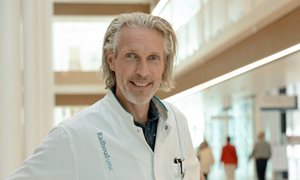
Dirk Lefeber, Professor of Glycosylation Disorders in Neurology at the Radboud university medical center, receives a Vici grant worth 1.5 million euros. He will use this grant to investigate why sugar metabolism differs between organs by use of stem cell models of muscle and brain. This will provide him with essential information to develop high-precision sugar therapies to treat patients with severe illness due to defects in suger metabolism.
Glucose is well known as energy source. However, at least nine other sugars, such as mannose and sialic acid, are used for incorporation into human proteins. We call this process ‘glycosylation’. Abnormal glycosylation has been linked to a wide range of human diseases. Sugar metabolism is a popular target to restore such abnormalities and thereby develop novel therapies. To what extend is our knowledge on the molecular mechanisms sufficient to do this? Not according to Lefeber.
He discovered that the sugar sialic acid is likely indeed used for glycosylation in our brain, however, broken down in our muscle as potential source for energy. He developed technology for detailed investigation of the complete sugar metabolome. In the current project, he will integrate this technology with novel advances in stem cell biology. He will differentiate stem cells of patients with a serious genetic defect in the metabolism of sialic acid to models of muscle and brain with the aim to fully uncover the disease mechanisms. Dirk Lefeber: “Based on this knowledge, we will explore chemical and genetic tools to develop high-precision therapies to treat these patients.”
Radboudumc Expertise Center for Disorders of Glycosylation
Dirk Lefeber (Elst, 1974) studies the mechanisms of protein glycosylation through research on hereditary disorders. Glycosylation is an essential process in our body by which proteins are modified with different sugars. Variations in this process occur with almost every disease. Disruptions in this process can have serious consequences. For example, a group of inherited muscle diseases are caused by an error in glycosylation. Although the biological language of our DNA and proteins is already well understood, this is certainly not the case for protein glycosylation.
To unravel the mechanisms, Dirk Lefeber is studying patients with genetic diseases at Radboud university medical center. He discovered several novel molecular pathways in sugar metabolism, for example for incorporation of sugars into skeletal muscle. Understanding such biological processes has already led to improved diagnostics and new treatments for patients. He also leads the Radboudumc Expertise Center for Disorders of Glycosylation and Radboud Consortium for Glycoscience.
About the Vici grant
Vici is one of the largest grants for individuals in the Netherlands and targets advanced researchers. They each receive 1.5 million euros from the Dutch Organisation for Scientific Research (NWO). With this Vici grant they can develop an innovative line of research in the field of medical research and care innovation and build their own research group over the next five years. Due to the hack of NWO, NWO and ZonMw can now only announce the laureates who have submitted to ZonMw. It is still unknown when applicants who submitted to NWO will be informed about their Vici proposal.
-
Want to know more about these subjects? Click on the buttons below for more news.
More information
Pauline Dekhuijzen

wetenschaps- en persvoorlichter
Related news items






